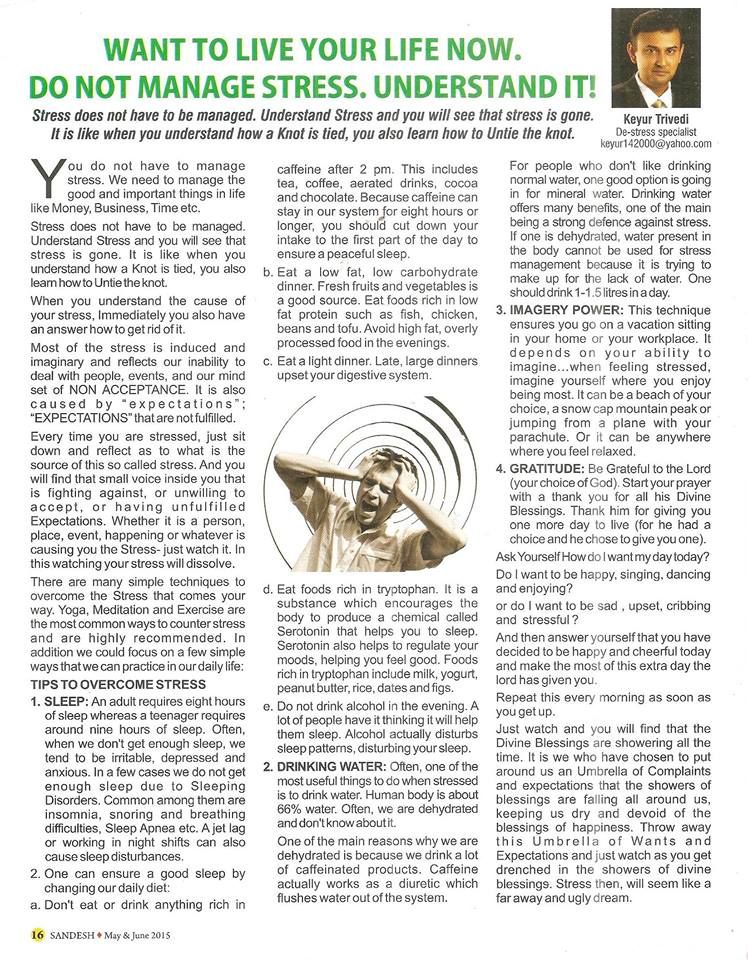|
 |
|
| WANT TO LIVE YOUR LIFE NOW. DO NOT MANAGES STRESS. UNDERSTAND IT! |
|
|
Local Trains: One of the most common stressor we face in our city is travelling in local trains. Since local trains help a large number of commuters travel to office and back home daily, it becomes one of the most important sources of inevitable stress. The local trains are over crowded and commuters end up being irritable, anxious and angry. Since they face this scenario on a daily basis, they become more reactive to stress at work and at home, thereby affecting their quality of life. Facing stress constantly takes a heavy toll on the body and mind as a result of which even the health of the individual is affected. Traffic Jams: Another common source of stress in our city is facing heavy traffic. A traffic jam not only causes direct stress because of the air pollution it causes, but it also causes Indirect Stress as people get so stressed up that their blood pressure rises, muscles tense and heart beats faster. If an individual were to interpret this same scenario differently; say as an opportunity to relax and listen to his favourite music CD before getting to work, he may not experience stress at all. So, A LOT DEPENDS ON ONE’S ATTITUDE. Unhealthy Socializing: A very common way to socialize is to eat out late, drink and smoke. Those who have dinner as their heaviest meal of the day, do not get a proper sleep as the digestive system is kept working overtime which affects the sleep cycle. Also, eating a high fat, high carbohydrate diet is naturally harmful to the body. Heavy drinking, smoking too much and staying up too late put direct physiological stress on the body. If you have had a late night or drink too much, it leads to frustration and low self esteem at work the next day. Also, a lot of people drink alcohol in the evening, thinking it will give them a good night sleep. Alcohol actually disrupts sleep patterns, making sleep less restful. Monsoons: Since we experience heavy monsoons every year, it results in considerable water logging in many parts of the city on a regular basis. A commute to school, office, to the airport or train station, when affected by a heavy shower adds to considerable frustration and stress as we are unable to get to our destination on time. One of the best ways to manage stress that comes your way is to plan your day properly, manage your time well and have a positive attitude. Of course, disappointments will always be there, but if you realise the cause of your stress, managing your life will be a lot easier. |
EFFECT OF STRESS ON HEART |
Stress has distinct effects on the cardiovascular system. Cardiovascular disease is the general term for the diseases of the circulatory system, mainly the heart, arteries and veins. Physical exercise like working out at the gym or playing a game can put the heart under a certain amount of stress that is beneficial provided the heart is not suffering from any disease. When the body including the cardiovascular system experiences stress, the stress hormones (Adrenaline and Cortisol) are released which prepare the body to face danger. It gives a sudden boost of energy that can be used to fight or flee from the perceived stressful situation. This results in the heart pressure to increase. Most of the time this is necessary, but if the stress is prolonged, then the heart has to work harder for a longer time. This can seriously harm the heart, causing long term blood pressure giving rise to heart attacks or strokes. It is also believed that the stress hormones make the blood thicker and stickier in anticipation of any potential wound or injury. The thicker blood can clot much easier and thus help in stopping the blood flowing out of the body through the wound. The thicker blood also makes the circulation of blood to the extremities of the body more difficult. Therefore, hands and feet are more prone to cuts and bruises and take a longer time to heal if the stress is prolonged. |
STRESS AND BLOOD PRESSURE: |
When your blood pressure is too high, you are more likely to develop heart disease. Your blood pressure differs according to the different mental stress activity. And your mental and emotional stress activity differs according to the duration you are under stress, how well you are prepared psychologically, your expectations and your stress management techniques. When you face any mental stress, your blood pressure increases, but differs according to your stressor and the situation. Chronic stress can result in cardiovascular disease, as it results in a prolonged activation of the sympathetic nervous system (a part of the nervous system that serves to accelerate the heart rate, constrict blood vessels, and raise blood pressure), resulting in high blood pressure which remains unchanged for a longer time. |
STRESS AND HEART RATE: |
When the body undergoes a stress response, the body prepares to protect itself with fight or flight response, resulting in an increase in the heart rate ensuring that the blood reaches all the body parts where blood is needed to fight or run. However, one doesn’t have to be threatened physically for this to happen. The body has the very same response when raising a toast in your best friend’s wedding, acting in a play or addressing an audience. Changes in behaviour may modify the cardiovascular response, especially the heart rate. Although studies show that stress alters the cardiovascular response, it does not necessarily prove that stress induces cardiovascular disease. |
PSYCHOLOGICAL STRESS AND CARDIOVASCULAR DISEASE: |
We all suffer from stress from time to time. And positive stress (eustress) which helps us remain motivated and energetic is healthy and helps us succeed. To remove stress in today’s fast paced world with constant pressure is virtually impossible. Chronic stressors such as marriage, death of a loved one or divorce as well as psychological stress have been found to have a link to cardiovascular disease. And a strong association has been found between psychological stress and cardiovascular disease. |
PERSONALITY AND STRESS: |
Personality attributes such as anger, hostility, depression and anxiety have been related to an increased risk of cardiovascular disease. Reacting to stress with anger increases the risk to cardiovascular disease, especially myocardial infarction (heart attack). Research has shown that men with Type A behaviour (being competitive, work obsessed and impatient) have a greater risk of developing coronary heart disease. Hypertension (high blood pressure) increases with hostility and impatience. One’s personality type and personality factors go a long way in determining how you react to stress and whether you will have cardiovascular disease. The way you perceive stress, and your behaviours, thoughts and reactions to stressors determines how stress affects your health and well being. Although stress and cardiovascular disease are related, it does not necessarily have to affect your health and well being adversely. A healthy diet and lifestyle, stress relaxation techniques, anger management and treatment of psychological stress certainly prevents cardiovascular disease. |
MAJOR STRESS RELATED CARDIOVASCULAR SYSTEM DISORDERS |
|
DIET TO DE-STRESS |
|
We surely live in demanding and stressful times. A lot of times we accept that we are stressed but fail to root out the real cause of Stress which is silently debilitating us. The first right step in dealing with Stress is to become aware of the various Stressors the body and mind is experiencing which may help us negotiate this fact of life which has assumed catastrophic proportions in our daily life…
RECENT STRESS STATISTICS FROM INDIA
DEPICT AN ALARMING SCENARIO: |
| TOP |
| © 2010 Youwithin. All rights reserved. | Sitemap |Privacy Policy |Credits |





